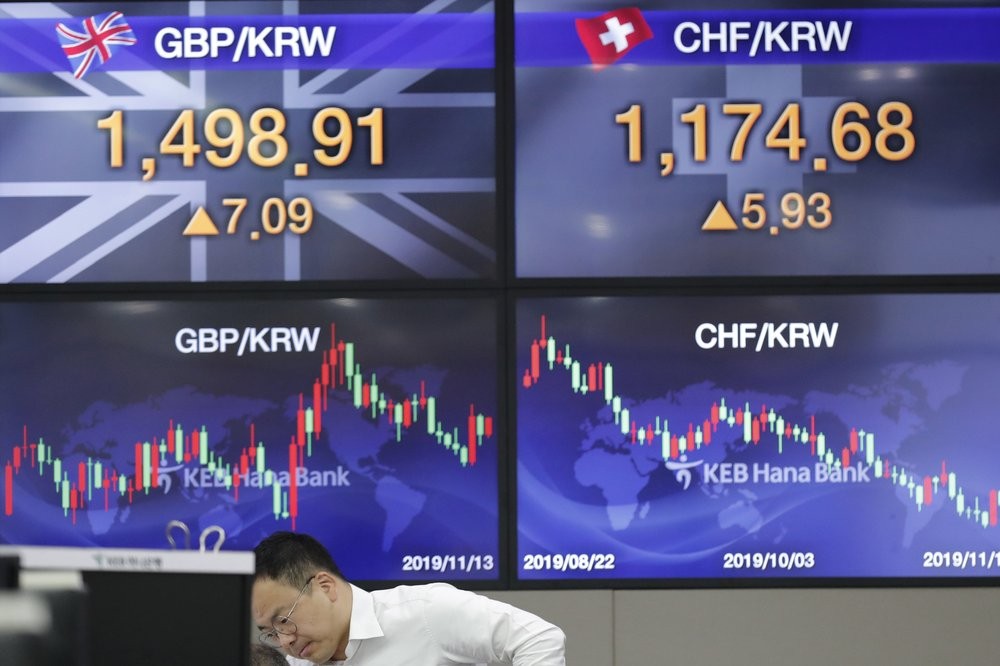Global stocks sink after Trump threatens more China tariffs

By JOE McDONALD
BEIJING, Nov 13 (AP): Global stocks sank Wednesday after President Donald Trump threatened more tariff hikes on Chinese imports if talks aimed at ending a trade war fail to produce an interim agreement.
Market benchmarks in London, Frankfurt, Shanghai and Tokyo declined.
Trump said Tuesday that an agreement on the “Phase 1” deal announced last month “could happen soon.” But he warned he was ready to raise tariffs “very substantially” if that fails.
The two sides disagree publicly about whether Washington agreed to roll back some punitive tariffs imposed in the fight over Beijing’s trade surplus and technology ambitions. The Chinese government said last week that was settled, but Trump denied that.
Trump’s comments “served as a reminder of the challenge that the two sides face,” said Jingyi Pan of IG in a report. However, she said, investors saw them as “positioning statements,” reducing their impact.
Wall Street closed Tuesday with modest gains.
In early trading, London’s FTSE 100 declined 0.4% to 7,338.51 and Frankfurt’s DAX lost 0.5% to 13,222.13. France’s CAC 40 shed 0.5% to 5,888.55. Wall Street, futures for the benchmark Standard & Poor’s 500 index and the Dow Jones Industrial Average were down 0.3%.
In Asia, the Shanghai Composite Index lost 0.3% to 2,905.24 and Tokyo’s Nikkei 225 sank 0.9% to 23,319.87. Hong Kong’s Hang Seng tumbled 1.8% to 26,571.46.
South Korea’s Kospi retreated 0.9% to 2,122.45 and Australia’s S&P-ASX 200 sank 0.8% at 6,698.40. India’s Sensex lost 0.3% to 40,215.20. Taiwan, New Zealand and Singapore declined.
Hong Kong shares, already under pressure from the U.S.-China tariff war and slowing global demand, have been jolted by growing violence in anti-government protests.
The protests began in June over a proposed extradition law and expanded to include demands for greater democracy and other grievances. Hong Kong tumbled into its first recession in a decade in the latest quarter.
On Tuesday, the S&P 500 ended up 0.2% while the Dow was unchanged. The Nasdaq gained 0.3% to a record.
Momentum for the market has been mostly upward for more than five weeks as worries about the U.S.-China trade war have eased.
Health care, technology and communication services stocks led gains Tuesday, outweighing losses in energy companies and elsewhere.
This week, the U.S. Labor Department is due to give updates on consumer and wholesale inflation. Economists expect a government report to show retail sales returned to growth in October.
Federal Reserve Chairman Jerome Powell is due to give testimony to Congress on Wednesday about the U.S. economy. Most investors expect the Fed to keep interest rates on hold for now after cutting them three times since the summer.
ENERGY: Benchmark U.S. crude lost 49 cents to $56.31 per barrel in electronic trading on the New York Mercantile Exchange. The contract fell 6 cents on Tuesday to close at $56.80. Brent crude, used to price international oils, shed 68 cents to $61.38 per barrel in London. It retreated 12 cents to $62.06 the previous session.
CURRENCY: The dollar fell to 108.92 Japanese yen from 109.01 yen. The euro advanced to $1.1016 from $1.1010.
Recent News

Do not make expressions casting dout on election: EC
14 Apr, 2022
CM Bhatta says may New Year 2079 BS inspire positive thinking
14 Apr, 2022
Three new cases, 44 recoveries in 24 hours
14 Apr, 2022
689 climbers of 84 teams so far acquire permits for climbing various peaks this spring season
14 Apr, 2022
How the rising cost of living crisis is impacting Nepal
14 Apr, 2022
US military confirms an interstellar meteor collided with Earth
14 Apr, 2022
Valneva Covid vaccine approved for use in UK
14 Apr, 2022
Chair Prachanda highlights need of unity among Maoist, Communist forces
14 Apr, 2022
Ranbir Kapoor and Alia Bhatt: Bollywood toasts star couple on wedding
14 Apr, 2022
President Bhandari confers decorations (Photo Feature)
14 Apr, 2022











